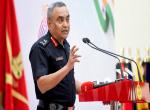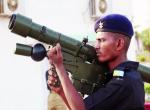For Tweedledum said Tweedledee had spoiled his nice new rattle.
Just then flew down a monstrous crow as black as a tar-barrel!
Which frightened both the heroes so they quite forgot their quarrel.
[Alice “Through The Looking Glass”. Lewis Carroll]
The Indian Armed Forces especially the Army, are the one institution where people repose their trust in a country in which almost every institution is viewed with extreme skepticism by the citizens. Where there is disorder and anarchy the Armed Forces are islands of discipline, where there is corruption on a horrendous scale the Armed Forces are models of rectitude, where there is panic the Armed Forces ensure calm, where there is disorder the Armed Forces represent order and where there is injustice the Armed Forces stand for justice. When all others turn tail the Armed Forces stand firm and united. That is the picture that the average Indian has of the Indian soldier. But most important of all, when all around us our neighbours sink into a morass of military dictatorship or military supported totalitarianism, India shines as a democracy in which the Armed Forces are proud to be a part of the whole but also accept that they are under civilian control, they are the Army of the people of India and they exist for India and not vice versa. That is the strength of our democracy.
Under Article 83(2) of the Constitution the supreme command of the defence forces of the Union is vested in the President and the exercise of supreme command is regulated by law. The Supreme Commander cannot use the Armed Forces for his own political ends, but in obeying the Supreme Commander the Armed Forces will function according to law. For example, under the Army Act, 1950 and the Rules framed thereunder every single officer, including a junior commissioned officer or a warrant officer, holds his commission from the President of India. Under section 19 it is the Central Government which has the power to terminate the services, by dismissal or removal, of any person subject to this Act, right from Sepoy to the Chief of Army Staff. Subject to the provisions of the Act command of the Army vests in the Chief of the Army Staff and he enjoys all the powers provided in the Act. In the matter of discipline, command, deployment, conduct of operations, waging of war itself, the Armed Forces are fully empowered and the Chief of each of the Armed Forces acts as the military advisor to government in all matters pertaining to his Force. In the matter of policy civil authority is supreme but in the matter of command and control the power vests exclusively in the Chief concerned. This was amply illustrated in the Bangladesh War when the decision to undertake the war lay with the Council of Ministers but the timing and conduct of operations were determined by Army Headquarters and the Chief of the Army Staff. This is the correct relationship of the civil and the military in a democracy. When this equation is disturbed disaster inevitably follows the worst example of which was the Sino-Indian border war of 1962. Signs of the sorry state of the Army were clearly there to see in the December 1961 Operation Vijay which ended Portuguese rule in Goa. As Secretary to the Chief Civil Administrator I was witness to the utter shambles in the Armed Forces, with the three Services at daggers drawn with each other and the Army miserably unprepared for any operation against a serious enemy. An arrogant Krishna Menon as the Defence Minister, a weak General Thapar as C.O.A.S. and an indecisive Jawaharlal Nehru as Prime Minister were together a prime recipe for disaster and in 1962 it befell us.
We did learn some lessons from 1962 war and gradually the Armed Forces were rebuilt. However, the politics of selecting the Service Chief continued to be quite murky and the overlooking of Lt. Gen. S.K. Sinha left scars which did not heal for quite some time. Of course Gen. Sinha, as befits an honourable man, immediately resigned from service and he did not make the life of the new Chief miserable by making an issue of the appointment. The episode of the removal of the Chief of Naval Staff, Admiral Vishnu Bhagwat, for his contempt of civil authority did leave a bad taste in the mouth, but it was necessary in order to ensure civil supremacy in a democracy. However, it is in our national interest that such a thing never recurs. Moving from history to the present day, we have a situation in which we have a Chief of Army Staff, Gen. V.K. Singh, who has given a new definition to the Army Chief voicing his thoughts. When Gen. Rodriguez was the Chief of Army Staff he made certain remarks about the need for the Army to be involved in the framing of civil policy, though the context in which he made these remarks was the growing involvement of the Army in the maintenance of law and order. He felt, and quite rightly too, that the civil power must put governance right in order to build up the capability of the police to deal with law and order, crime, militancy and even insurgency which fell short of threatening the integrity of the country. It is because the police had been politicised and made ineffective that the Army had to be deployed in situations in which in the past the State Armed Police and the Central Police Forces were adequate to restore order. Prolonged deployment of the Army was cutting into the training programme of the Army to prepare it for war and excessive exposure to civil affairs was affecting the morale of the Army. Unfortunately the remarks of the Chief were read out of the context and he was severely reprimanded. Now the Chiefs withdrew into a shell, which is also not a good thing so far as healthy civil-military relationship is concerned.
Gen. V.K. Singh came in as a crusader against corruption in the Army. Two things happened. One was a series of courts martial against many senior officers and the second was a feeling in Army Headquarters that defence procurement initiated under earlier Chiefs was suspect. Purchase of vital equipment such as 155mm artillery guns, 155mm light artillery guns, new tanks and other armoured fighting vehicles, purchase of ammunition and even infantry weapons was put on hold. Part of the reason was infighting in Army Headquarters, part of it was an extremely weak government which was scared of its own shadow post Bofors, part of it was a system in which the press and the politicians smelt corruption where there was none and arms brokers who, if they found that their items were not being approved, spread insidious rumours about wrongdoing in purchases. The entire procurement process virtually came to a halt. As Gen. Vij once remarked, “It takes years from the point of deciding a weapon system to its actual delivery and delay in the process become so prolonged that the system becomes obsolete before it is acquired”. This is the bind in which our Armed Forces now find themselves and politicians, journalists, timid bureaucrats and senior military officers are all equally responsible for this situation. The next war against Pakistan and China will be fought by the Indian Army with slingshots and quarter-staves.
One thing is clear. In a country as strapped for resources as we are one needs much greater integration between the Armed Forces, the Armed Forces and the Ministry of Defence and the National Security Council and the National Security Advisor, various intelligent agencies and the Forces’ Headquarters and Ministry of Defence in order to ensure optimum use of resources. Despite the opposition of one of the Armed Forces we must appoint a Chief of Defence Staff who will ensure a balance between the Forces in the matter of their respective roles, their organisation and their equipment. The National Security Advisor would provide government with the threat perceptions, immediate, in the near future and in the foreseeable future and together with the Defence Secretary and the Chief of Defence Staff the respective roles of the three Armed Forces would have to be worked out. Ultimately all weapon acquisition should be routed through the CODS. The role of the Defence Secretary as the Principal Advisor to the civil government would remain unchanged, but the entire professional advice and the technical requirements of the Armed Forces as projected by each of the Service Chiefs would be integrated by the CODS.
The matter of acquisition, increasingly through local production, but from abroad where necessary should be streamlines. Each Service Chief, through CODS, should determine what systems are necessary and then identify where the systems are best available. No doubt prices would fluctuate, but when we are talking about high end technology, the price difference is likely to be within a range in which the top and the bottom will not be too far removed. Price, therefore, cannot be the determining factor. It is the quality of weaponry that really counts. Once the Services are able to convince government about their requirements the budget should be immediately approved and placed at the disposal of the Service Headquarters concerned. The Service Chief should then constitute a Procurement Board, which should have a member representing Finance also. Government must prepare a procurement manual which lays down all the parameters for arriving at a conclusion and the Procurement Board must strictly follow the guidelines. The process should be open and subject to scrutiny, with the Chief of Defence Staff providing superintendence. However, the decision of the Procurement Board must be final and the Board itself should have the authority to issue purchase orders. The case need not go back to government. The representative of Finance should have the power of veto, which must be exercised very sparingly. If we cannot trust the three Service Chiefs and the Chief of Defence Staff to take honest decisions then these officers should not be in office. Once a decision is taken, unless there is really good cause to believe, based on hard evidence, that the process is tainted, there should be no intervention in procurement and government must defend the decision in public, before the media and in Parliament. If this happens, if delay is eliminated, if frivolous and mischievous complaints are not entertained, our Armed Forces will get the weapons that they need, corruption will be reduced or eliminated and the country will feel secure. This lesson must be learnt from the present crisis.
This article begins with a citation from ‘ Through the Looking Glass’. The Army Chief writes to the Prime Minister that the Indian Army is so badly equipped and so short of ammunition that it cannot fight a war. Normally it would be for Pakistan’s ISI to find out this sorry state, but why should it bother when the Army Chief himself revealed the situation? Then this wretched letter leaks and becomes public property. The one person who risks losing his job is the Director General, Inter-Service Intelligence of Pakistan, who will have no espionage role left when the Army Chief of India is providing all the information. Instead of looking at the seriousness of what is being revealed both the Defence Minister and the Army Chief are busy lamenting the fact that the letter did not remain confidential. The contents of the letter are now secondary. Both Tweedeldum and Tweedledee are fighting over who leaked the letter and the Prime Minister is observing a Buddha like silence. He should have peremptorily dismissed, and I mean dismissed, both the Defence Minister and the Chief of Army Staff for playing stupid games while India burns.
I hope Gen. V.K. Singh’s successor has the good sense to rebuild the confidence of senior officers in their Chief, of the junior officers in their seniors, of the jawans in their officers and in the Army in which they serve and the confidence of the nation itself in the health of the Army. Government on its part must introspect on the changes it must bring about so that the events of the last two years never recur. Let us create the post of Chief of Defence Staff. Let us create a very strong Personnel Board in the Armed Forces which, in each Service, keeps the full record of every rank in the Forces from jawan to General, which record must be immutable. Let us have a Promotion Board which ensures that the entire process of promotion, especially to the senior most ranks, is totally open and transparent and that even those who are left out are convinced that the decision is fair and just. Let us remove the whimsicality of the Chief as the sole criterion for promotion. If government does these things, if it streamlines the process of procurement, it will have done a great service to the nation because our Armed Forces would then become our true shield and buckler against all enemies.
Published Date: 11th May 2012






.jpg)


Post new comment